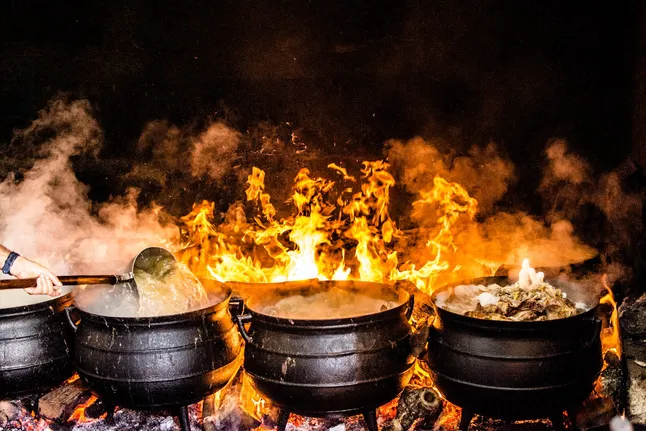Africa, with its sizeable and diverse panorama, is a continent that not just most effective captivates with its breathtaking surroundings but also tantalizes the flavor buds with a rich and sundry culinary history. From the spices of North Africa to the colourful flavors of West African dishes, the continent gives a culinary adventure like no other. In this exploration, we delve into the numerous and delectable world of African delicacies, uncovering the unique elements, traditional cooking strategies, and the cultural significance of dishes that make this continent a food lover's paradise.
North Africa: A Symphony of Spices
The northern areas of Africa, consisting of Morocco, Tunisia, Algeria, Libya, and Egypt, boast a culinary tapestry woven with tricky flavors and fragrant spices. Moroccan delicacies, famend for its couscous, tagines, and pastillas, is a pleasing amalgamation of candy and savory. The aromatic combo of cinnamon, cumin, coriander, and saffron transports diners to a sensory haven.
In Egypt, street meals including koshari, a mix of lentils, rice, pasta, and highly spiced tomato sauce, offers a burst of flavors. The iconic Egyptian dish falafel, crafted from fava beans or chickpeas, is a staple that has won global popularity. North African delicacies is not best a ceremonial dinner for the palate but additionally a journey via the records of the ancient trade routes that added an array of spices to the area.
West Africa: Bold Flavors and Hearty Dishes
West African delicacies is understood for its formidable and sturdy flavors, frequently characterised by way of the use of chili peppers, ginger, and aromatic herbs. Countries like Nigeria, Senegal, Ghana, and Mali contribute to the numerous culinary landscape of the region. Jollof rice, a one-pot dish made with tomatoes, peppers, and various spices, is a West African favourite and a staple at celebratory occasions.
In Nigeria, the hearty and flavorful Egusi soup, made with melon seeds, leafy vegetables, and numerous meats, displays the use of a's love for wealthy and satisfying dishes. Suya, a popular avenue meals in Nigeria, functions skewered and grilled meat covered in a spicy peanut blend, supplying a delicious mixture of textures and tastes.
East Africa: Spice Islands and Coastal Influences
East African delicacies, influenced by Indian, Arabian, and Persian flavors, boasts a numerous variety of dishes. The coastal regions, along with countries like Kenya, Tanzania, and Mozambique, incorporate coconut milk, clean seafood, and fragrant spices into their culinary creations. Biriyani, a aromatic rice dish, is a testomony to the Indian influence within the area.
In Ethiopia, injera, a spongy flatbread made from fermented teff flour, is a staple that accompanies a variety of stews and curries. The specific communal dining experience of sharing dishes on a big injera-included platter adds a social detail to the meal. East African delicacies showcases the fusion of various cultural influences, ensuing in a harmonious combo of flavors.
Southern Africa: Grilled Delights and Indigenous Ingredients
The southern part of Africa, together with South Africa, Namibia, Botswana, and Zimbabwe, offers a culinary revel in that celebrates indigenous ingredients and culinary traditions. South African braai, or fish fry, is a occasion focused round grilled meats, frequently accompanied by way of boerewors (sausages) and sides like mieliepap (maize porridge).
In Zimbabwe, the staple sadza, a cornmeal porridge, is normally served with lots of relishes, presenting a comforting and filling meal. Southern African cuisine highlights the usage of sport meats, inclusive of springbok and kudu, as well as domestically sourced produce, creating a completely unique and sustainable culinary experience.
Central Africa: Cassava, Plantains, and Forest Flavors
Central African delicacies, characterized by way of its reliance on staples like cassava, plantains, and tropical fruits, gives a flavor of the lush rainforests and numerous ecosystems of the region. Dishes like fufu, a starchy aspect crafted from pounded cassava or plantains, are frequently served with flavorful stews and sauces.
Cameroon's Ndolé, a dish featuring bitterleaf vegetables, groundnuts, and diverse proteins, is a savory and complex flavor experience. Central African culinary traditions draw suggestion from the place's biodiversity, showcasing a harmony between indigenous components and traditional cooking techniques.
Cultural Significance and Culinary Traditions
African cuisine is not just about the substances and flavors; it's far deeply intertwined with cultural traditions and social rituals. Many African dishes maintain symbolic which means and are an integral part of ceremonies, celebrations, and every day lifestyles. The act of sharing a communal meal, breaking bread with others, is going past nourishment—it's miles a cultural practice that fosters team spirit and community bonds.
In many African societies, the education of meals is a communal effort, frequently involving more than one generations. Traditional cooking methods, such as open-hearth cooking and sluggish simmering, make a contribution to the distinct flavors and textures of African dishes. The use of regionally sourced, seasonal substances not only displays a commitment to sustainability however also provides a freshness and authenticity to the cuisine.
Preserving and Celebrating Culinary Heritage
As Africa undergoes speedy urbanization and globalization, there's a developing focus of the importance of maintaining and celebrating culinary historical past. Chefs and culinary fans are rediscovering traditional recipes, adapting them to trendy tastes, and selling nearby substances.
Food fairs, culinary excursions, and cooking classes centered on African cuisine are gaining popularity, imparting locals and vacationers alike with the opportunity to immerse themselves within the richness of flavors. Efforts to report and proportion traditional recipes make a contribution to the renovation of culinary information, ensuring that destiny generations can preserve to savour the authentic tastes of Africa.
Exploring African Cuisine and Best Places to Travel
Beyond the culinary delights, exploring African cuisine opens doorways to some of the best places to travel at the continent. From the bustling markets of Marrakech in Morocco to the colourful avenue food scenes in Lagos, Nigeria, every destination offers a completely unique and immersive experience for food lovers.
For those seeking the great locations to go to within the global for a culinary adventure, Africa stands as a top contender. The diverse flavors and regional specialties provide a wealthy tapestry of tastes, making it a haven for meals fans. Travelers can embark on a gastronomic adventure via nearby markets, road meals stalls, and traditional eateries, gaining insights into the cultural significance of every dish.
Traveling on a Budget: Affordable Culinary Exploration
Traveling on a finances does not mean sacrificing the pleasure of culinary exploration. In Africa, less expensive and scrumptious food experiences abound. From the price range-pleasant road food stalls in Cairo's Khan El Khalili market to the nearby eateries serving real West African dishes in Accra, Ghana, there are plenty of alternatives for the ones mindful in their expenses.
Utilizing the pleasant tour apps may be useful whilst navigating neighborhood culinary scenes on a budget. These apps can guide tourists to hidden gemstones, provide reviews and guidelines, and even help in decoding local menus. Exploring African cuisine on a finances is not most effective possible but adds a further layer of authenticity to the travel experience.
Best Travel Blog: Sharing Culinary Discoveries
For avid tourists and meals enthusiasts, creating the great journey blog becomes a way to find the culinary discoveries and cultural insights gained during their African adventures. Documenting the pleasant locations to travel, should-strive dishes, and personal stories provides a storytelling detail to the exploration of African delicacies.
A nicely-curated travel blog can encourage others to embark on their culinary journeys, offering realistic tips, pointers, and a glimpse into the diverse international of African meals. From private anecdotes to in-intensity publications on navigating neighborhood markets, a travel weblog becomes a digital diary that resonates with fellow vacationers and food enthusiasts alike.
Conclusion: A Culinary Expedition Across Continents
Tasting the richness of African cuisine is greater than only a culinary journey; it's far an exploration of records, lifestyle, and the colourful range that defines the continent. From the bold and spicy dishes of West Africa to the fragrant stews of North Africa, every location contributes its personal bankruptcy to the culinary narrative.
Beyond borders, African cuisine invitations us to enjoy the memories told through every element, every spice, and every communal meal. It is a celebration of lifestyle, innovation, and the shared pleasure of breaking bread with others. So, embark on a culinary day trip throughout the giant and varied landscapes of Africa, and permit the flavors of the continent wake up your senses to the splendor of its culinary heritage.






